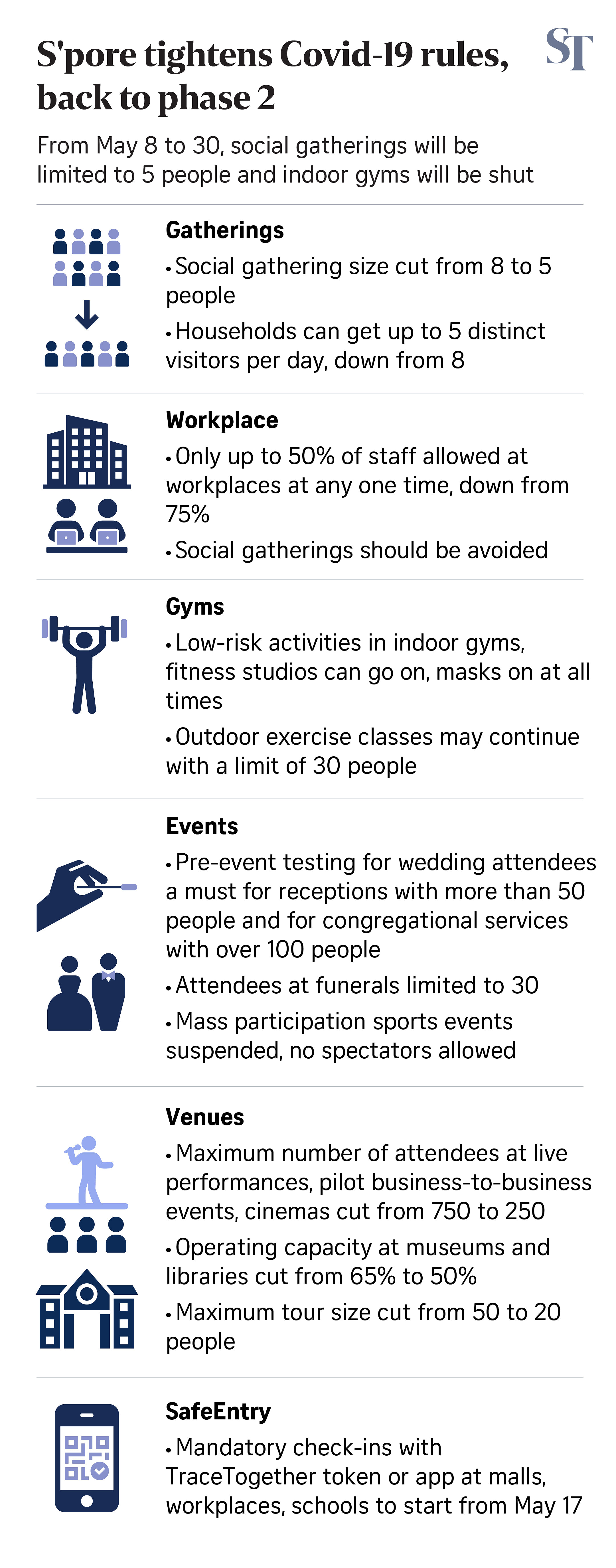Singapore will be tightening measures to try to stem the rising number of community cases which have climbed to 60 in the past week - more than the total for the first quarter of the year.
The multi-ministry task force for Covid-19 on Tuesday (May 4) announced a whole slew of measures, such as scaling back the number of people allowed to gather or visit others, and bringing in testing for events with more than 100 participants. All indoor gyms will be closed.
But frankly, while such measures indicate how seriously the Government is taking the surge in cases here - there are now nine different clusters - they will not work without the full cooperation of the population.
It is the people of Singapore whose actions will decide if the country will face a continued surge in cases, or whether these can be rapidly contained.
There are probably several reasons for the recent surge in locally transmitted cases here.
One is that more infectious variants have been found here, including all three variants of concern from Britain, Brazil and South Africa, as well as the two variants of interest underlying the massive explosion of cases in India. This makes the surge in cases more difficult to prevent.
In the case of the large Tan Tock Seng Hospital cluster, the fault may even lie "with the airflow and ventilation in the ward", postulated the Health Ministry's director of medical services Kenneth Mak.
Nevertheless, complacency among the population here is also likely to have contributed to the local transmissions. Singapore's success in controlling the outbreak over the past year has probably played a part, as has Covid-19 fatigue.
This is very human, very understandable, but very dangerous.
Mask wearing is compulsory, but it is not uncommon to see people with their masks pulled below their noses; or even not being masked at all so long as they have a drink in hand.
In other words, they have been following the letter of the law, but not the spirit behind it.
Similarly, train commuters are repeatedly reminded not to talk - but there is hardly a compartment where one does not find at least one passenger on the phone, or a group animatedly chatting.
A country can put the most stringent rules in place, but without the willing cooperation of its citizens, it will find it hard to ward off a second wave of infections.
It is not enforcement that will determine whether the measures just introduced succeed or fail, but the behaviour of the people.
In order to control community spread, Singapore needs the full cooperation of the community.
Some of the recent cases had symptoms but did not see a doctor till their illness became more severe. They were probably worried that they would have to stay isolated while awaiting results.
But by not getting checked for Covid-19 and going about life as normal, they raised the risk of transmitting the virus to others.
People need to remember that the ones most likely to pick up the disease from them would be the people they are closest to - family, friends and co-workers.
A country can put the most stringent rules in place, but without the willing cooperation of its citizens, it will find it hard to ward off a second wave of infections.
It is not enforcement that will determine whether the measures just introduced succeed or fail, but the behaviour of the people.
If Singaporeans act responsibly, they would again be able to enjoy a relatively normal lifestyle, where friends can meet, games can be played, live entertainment can resume - though with safety measures still in place.
If they don't, they only have to look at countries which thought they had defeated the virus - only to pay a terrible price.













